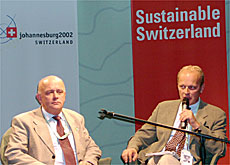
Swiss put brave face on prospects for faltering summit

Swiss delegates at the Johannesburg Earth summit say they believe a global accord will be reached, but admit that it is likely to be devoid of substance.
Chief Swiss negotiator, Serge Chappatte, said Switzerland had significantly lowered its expectations ahead of next week’s ministerial negotiations.
He told swissinfo that he still anticipated a global action plan of the “lowest common denominator”, which means without binding obligations and little in the way of timetabled international commitments to tackle poverty and safeguard the environment.
“Of course we all hoped for the moon,” he told swissinfo, “but you have to be happy with what you end up with.”
Better than Bali
Chappatte noted that the atmosphere inside the conference hall was “an improvement” on the final preparatory talks prior to the Earth Summit held at the end of May in the Indonesian resort of Bali.
“Here we are working each night until midnight, but in Bali we were up until four in the morning without any tangible result,” he said.
Chappatte – who is representing Switzerland in his capacity as deputy director of the Swiss Development Agency – also suggested negotiators were finding it difficult to “strike a balance between the environmental, economic and social aspects” of a putative international treaty.
“The theme of sustainable development is a very vast one, but we insist on tackling all these aspects and we have to strike a balance to give an example to the world,” he explained.
“Of course none of this makes the negotiations very easy.”
Battle lines drawn
Beat Nobs, Swiss Ambassador for the Environment, told swissinfo during the third day of plenary negotiations that battle lines between trade and environment were being drawn at the negotiating table.
“Very often – and regrettably so – the environment is being seen here as an obstacle to trade,” said Nobs.
René Longet, a member of the Swiss negotiating team representing non-governmental organisations, says he regrets the exclusion of NGOs from many of the United Nations-sponsored plenary sessions.
“On the one hand, the UN has invited representatives of civil society to Johannesburg, but [now they are here] they are not being involved enough in the processes,” he said.
That hasn’t stopped NGOs from making their voice heard. The environmental organisation, Greenpeace, used the sidelines of the summit to launch its “Corporate Crimes Report”, a scathing attack on multinational corporations it perceives to have failed to implement policies of sustainable development.
The Swiss pharmaceutical company, Novartis, as well as Ciba Speciality Chemicals and agribusiness Syngenta, all stand accused in the report of failing to take responsibility for the dumping of chemical waste at various sites in Switzerland and abroad between the 1940s and 60s.
Business in the dock
Correspondents said that while the content of the report was nothing new, the timing of its release – just as businesses and CEOs are preparing to take part in a major Business Day at the summit on Sunday – was an attempt to undermine the influence of corporate leaders gathering at the conference.
Wangpo Tethong, representative of Greenpeace Switzerland at the summit, says multinational corporations have no place at the international conference unless they can prove – and not just parade – their sustainable development credentials.
“There is no objection that these companies come here to take part, but we feel they have to do a lot of homework,” Tethong said.
“And if you observe the mechanisms of the conference, you see the big corporations are trying to push the governments not to make binding commitments… and for me this is a very troubling sign of their attitude towards sustainable development,” he added.
Big business will have the chance to respond to the accusations at Sunday’s seminar hosted by Business Action for Sustainable Development, one day before the arrival of the Swiss foreign minister, Joseph Deiss, who is due to address the summit’s plenary session at the start of next week.
swissinfo, Ramsey Zarifeh, Johannesburg
The Swiss were hoping a global action plan would fix a timetable for commitments to reduce poverty and protect the environment.
Battle lines are being drawn both in and outside the official summit between non-governmental organisations and big business.
High-level ministerial negotiations – to be attended by around 100 heads of state and government – are due to begin next week.

In compliance with the JTI standards
More: SWI swissinfo.ch certified by the Journalism Trust Initiative

























You can find an overview of ongoing debates with our journalists here . Please join us!
If you want to start a conversation about a topic raised in this article or want to report factual errors, email us at english@swissinfo.ch.